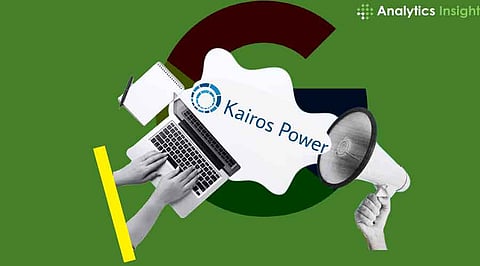

Alphabet's Google has agreed to the world's first corporate purchase power deal from multiple small modular reactors (SMRs) to meet the growing electricity demands of AI.
Google has also announced its agreement with Kairos Power. According to the agreement, the SMR power maker will deploy the company's very first reactor in 2030 followed by further deployments in 2035. In late 2023 Kairos Power first attained a construction permit from the NRC for its demonstration reactor to be situated in Tennessee.
Under the deal, Google has contracted to buy 500 megawatts of power through six to seven SMRs. The reactors would be smaller and more agile than any other power plant, with the possibility of producing energy more reliably.
According to Michael Terrell, Google's senior director for energy and climate, "We feel like nuclear can play an important role in helping to meet our demand cleanly in a way that's more around the clock."
This cooperation is taking place when the energy consumption level of technology companies has increased drastically. The increased consumption levels are a result of the need for nuclear energy solutions to meet the booming demands of advancements in AI.
Goldman Sachs maintains that power usage by US data centers is set to roughly triple from now to 2030, requiring around 47 gigawatts of new generation capacity. To meet this swelling demand, some of the world's biggest tech companies are doing deals with nuclear power firms.
Amazon recently bought a nuclear-powered data center from Talen Energy. Microsoft signed an agreement with Constellation Energy to aid in the refurbishment of one of the units at the Three Mile Island plant in Pennsylvania. The company is in the process of attaining complete construction and design approvals from the US Nuclear Regulatory Commission and other agencies within its region. The process can take many years before it becomes a reality.
SMRs, although promising, however, are expensive, and may never realize economies of scale as in larger plants. In addition, nuclear waste management is a contentious issue, and the US doesn't have a permanent repository for nuclear waste.
A report by The Guardian has further highlighted that the emissions of Google, Microsoft, Apple, and Meta-controlled data centers amount to 662% higher than the actual claims.
This poses a very important question regarding the failure of these tech titans to demonstrate accountability regarding their environmental impact. This is a red flag to their commitment to sustainability.
In partnering with Kairos Power, Google said it was committing to its demand for clean energy as well as long-term investment in the acceleration of small modular reactors.
"We're confident this novel approach is going to improve the prospects of our projects being delivered on cost and schedule," said Mike Laufer, CEO and co-founder of Kairos.
The partnership of Google with Kairos Power may prove to be the solution paving the way towards sustainable growth. Just like the challenges it will face in the tech sector, rising energy needs continue to haunt technology firms.
